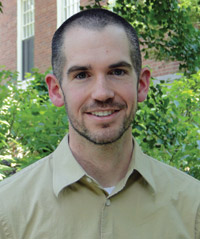 When considering his call to church planting, the Rev. Chris Brown ’08 quipped with professors, “If this doesn’t work, you’d better change what you’re teaching, because this is everything that you taught us!”
When considering his call to church planting, the Rev. Chris Brown ’08 quipped with professors, “If this doesn’t work, you’d better change what you’re teaching, because this is everything that you taught us!”
Though he had no intention of starting a new congregation when he first came to seminary, Chris went on to become the founding pastor of The Upper Room, a church plant in Pittsburgh’s Squirrel Hill neighborhood. He also served as the Seminary's first coordinator of the Church Planting Initiative at PTS.
Through weekly prayer, discussions with PTS faculty, and a conversation with Pittsburgh Presbytery’s director of New Church Development, Chris and Upper Room co-pastor, Michael Gehrling ’08, felt called to new church development. Chris explains, “I knew it was a good way to live out the ‘missional’ calling of the church. With people in our culture increasingly claiming no religious affiliation, church planting can be one of the best ways to reach out to the unchurched and call them into relationship with Christ.”
New congregations are important for the future of the church because they provide laboratories for experimenting with new ideas. Can a new congregation be started on a small budget with two part-time co-pastors? Let’s try. Can we worship in nontraditional spaces, such as living rooms and storefronts? Let’s try. Can we use different styles of music and liturgy? Let’s try.
“In this sense, church planting is like the ‘research and development’ arm of the church,” says Chris. “We try new things and discover what works for effectively and authentically bringing new disciples to Christ, thus providing lessons from which the broader church can learn.”
